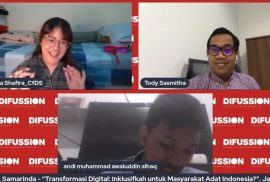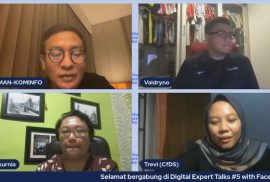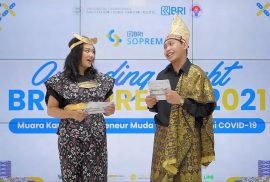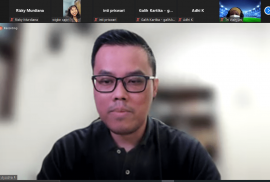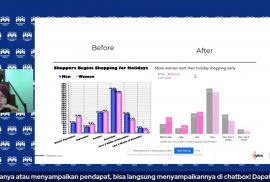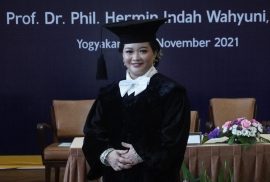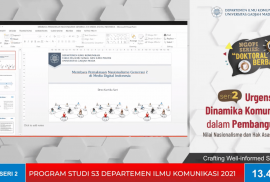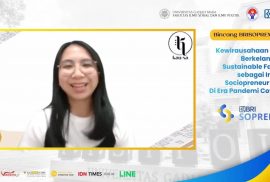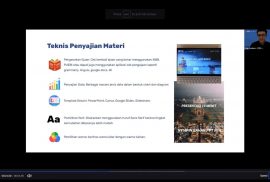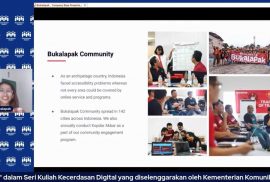Yogyakarta, November 12th 2021─Center Digital for Society (CfDS) of FISIPOL UGM in collaboration with BEM FH Mulawarman University held Diffusion #63 entitled “Digital Transformation: Is it Inclusive for Indigenous Peoples of Indonesia?” on Friday (12/10). The event, which took place via the CfDS UGM Youtube streaming, invited speakers Irnasya Shafira, as the Research Associate of CfDS and Tody Sasmitha, as a Traditional Law Lecturer at the Faculty of Law of UGM.In the presentation session, Irnasya said that internet access is very important in digital transformation. In 2019, the highest proportion of individuals using the internet was in DKI Jakarta province at 73.46% and the lowest in Papua province at 21.70%. According to Irnasya, Papua is experiencing geographical challenges where the position of Papua itself is very extreme and diverse geographically.
News
Yogyakarta, November 11th 2021─Implementation challenges in drafting the Personal Data Protection Bill (PDP) to protect personal data in the era of big data and the digital economy are discussed in Digital Expert Talks #5. The discussion in collaboration with Facebook Indonesia presented four speakers, namely Andhityo Rizaldi, Member of Commission I of the House of Representatives of the Republic of Indonesia; Tuaman Manurung, Sub-Directorate of PDP Governance of the Ministry of Communication and Information of the Republic of Indonesia; Noudhy Valdryno, Public Policy Manager for Facebook Indonesia and Timor Leste; and Dr. Novi Kurnia, JAPELIDI Coordinator & Lecturer of the Department of Communication Science of UGM.
Yogyakarta, November 10th 2021─BRISOPREMA 2021 Awarding Night with the theme “Accommodating Youth Sociopreneur’s Creation in the COVID-19 Pandemic Era” was held on Wednesday (10/11) through Fisipol UGM’s channel Youtube streaming. This event closed the BRISOPREMA 2021 line of events held by Fisipol UGM, YouSure, Visitama, Kafisipolgama, and Creative Hub. The SOPREMA event has been going on for six years and this year it was held with BRI and Indonesia’s Ministry of Youth and Sport as the sponsors. The Dean of Fisipol UGM, Wawan Mas’udi, started the show with an opening statement and by saying congratulations to BRISOPREMA 2021 winners for their achievements. “You all have been a part of the social movement to foster social entrepreneurship that is one of the most important streams of socio-economic business in this country,” he said. This was followed with a remark from BRI’s President Director, Sunarso, who voiced his support for BRISOPREMA 2021 that is in line with BRI’s goals as a national company which are to create and deliver economy and social value.
“Regardless of profession and career background, it’s good for us to know and have the skills to make policy briefs, because these skills can help the process of conveying ideas effectively,” Ayodha said, in the event moderated by Wigke Capri, a Lecturer of DPP UGM, and attended by 45 participant.
In this case, the webinar can facilitate training in writing strategic policy briefs and can get the attention of the intended audience.
Before writing a policy brief, there are several aspects that need to be considered, including starting the question why we write a policy brief, then how do we write down the existing ideas, and finally what is the goal we want to achieve from the policy brief. These questions can guide the writing process that starts from individual empathy and produces well-structured writing.
The purpose of data visualization is to group relevant information close together and separate the less relevant information so that readers can analyze it easily.
In addition, visualization is also useful to see the relationship between variables that influence each other. The existence of visualization makes the reader understand the story behind the data because the selection of the right visualization can compose the story so that it is easy for readers to understand. In this case, visualization emphasizes the element of simplicity rather than beauty in its use.
Yogyakarta, November 9th 2021─The Faculty of Social and Political Science (Fisipol), Gadjah Mada University (UGM) held a Professor Inauguration Speech event by Prof. Dr.phil Hermin Indah Wahyuni, M.Si. from the Department of Communication studies. The event was held offline for a small number of guests and also online. In the event that lasted from 10.00 to 11.00 WIB, Professor Hermin gave a speech titled “Autopoiesis Communication as the Energy for Social System Adaptation: Response, Resonance, (R)evolution”.
Yogyakarta, November 5th 2021─After previously successfully holding the first edition of the NGOPI “Doctoral Sharing” Series last August to discuss communication issues in the realm of local government and infrastructure, the Program of Doctoral Study of the Department of Communication Sciences of FISIPOL UGM held its second edition on Friday (5/10). By raising the title “Urgency and Dynamics of Communication in Development: The Value of Nationalism and Human Right”. In this second edition of the NGOPI “Doctoral Sharing” Series, the speakers and discussants seek to demonstrate the interdisciplinary nature of communication science that can enter into various aspects of life and fields of studies.
Yogyakarta, November 5th 2021─The BRISOPREMA #2 discussion with the title “Sustainable Social Entrepreneurship: Sustainable Fashion as an Innovation for Young Sociopreneurs in the Era of the COVID-19 Pandemic” was held via YouTube Fisipol UGM streaming on Friday (5/11). The BRISOPREMA #2 Talk is one of a series of annual BRISOPREMA FISIPOL UGM events, where the BRISOPREMA #2 Talk was held last month. On this occasion, BRISOPREMA presented a speaker from the side of social entrepreneurs engaged in sustainable fashion, namely Feshia Wijaya the Owner of Kausa Indonesia.
Yogyakarta, November 3rd 2021─Fisipol UGM’s Unit of Academic Innovation is back with a student workshop titled “Interactive Presentation” on Wednesday (3/10). The speaker was Muhammad Irfan Sedana, a Social Media and Publication Coordinator in CfDS. The event was held through Zoom on 16.00 WIB and was attended by a couple of students.
In the material sharing session, Irfan Sedana talked about the basics of presentation, starting from the creation, research, data elaboration, how to present the presentation, and how to interact with the audience. Presentation skills are important, not only for when we are in university but also later on when we have a job.
Yogyakarta, November 3rd 2021─Digital Literacy Fisipol UGM held the 7th Ask Me Anything Session titled “Adaptation and Innovation: The Fool-Proof Way to Develop Your Small Business” on Wednesday (3/10). The event invited Agisti Dewi Rani from Bukalapak as the speaker and it was live streamed through Digital Literacy Youtube Channel, seen by the public and students.
The discussion was divided into two sessions, which are the material sharing and question and answer session. With the rise of internet users in Indonesia, e-commerce has the opportunity to grow to 54% in 2020. The rise of e-commerce is not without its challenges which can be divided into the technology, infrastructure, and financial inclusion aspect.

